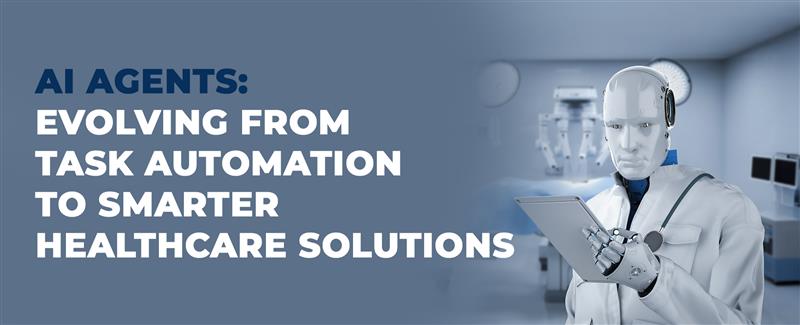
Healthcare systems worldwide are experiencing unprecedented transformation as AI agents evolve from simple automation tools into sophisticated intelligent systems. These advanced technologies are reshaping how medical professionals deliver care, how patients interact with healthcare services, and how healthcare organizations operate.
The financial implications are substantial. Industry projections indicate the AI healthcare market will surge from $20.9 billion in 2024 to $148.4 billion by 2029, representing a remarkable compound annual growth rate of 48.1%. This explosive growth reflects the technology’s proven ability to enhance patient outcomes while simultaneously reducing operational costs.
AI agents distinguish themselves from traditional automated systems through their capacity to process vast amounts of patient data, medical research, and real-time sensor information to generate personalized recommendations. Unlike conventional automation that follows predetermined scripts, these intelligent systems learn, adapt, and make contextual decisions that support both medical professionals and patients around the clock.
Understanding AI Agents in Healthcare Context
AI agents represent autonomous, artificially intelligent systems designed to accomplish specific healthcare objectives through independent operation within their environments. These sophisticated tools combine machine learning algorithms, natural language processing, and advanced analytics to gather information, analyze patterns, and execute appropriate actions.
The global AI agents market demonstrates remarkable momentum, with valuations expected to grow from $5.29 billion in 2024 to $216.8 billion by 2035. This expansion reflects their increasing integration across various healthcare applications, from diagnostic support to patient care management.
These digital assistants excel in two primary areas: medical diagnosis enhancement and comprehensive patient care delivery. They provide immediate responses to patient inquiries, offer precise medical information, and maintain continuous availability for support services. Healthcare professionals benefit from reduced administrative burdens while patients receive more personalized, responsive care experiences.
Core Advantages of Healthcare AI Implementation
Enhanced Patient Engagement and Accessibility
AI agents revolutionize patient interaction through conversational interfaces that provide immediate medical assistance and educational resources. Their 24/7 availability enables patients to schedule appointments, access medical information, receive medication reminders, and obtain follow-up care guidance without time constraints.
Operational Excellence and Efficiency
Healthcare organizations achieve significant operational improvements through AI-driven automation of administrative tasks. Claims processing, appointment scheduling, and data management become streamlined processes that free healthcare workers to focus on direct patient care rather than paperwork management.
Intelligent Decision Support Systems
Advanced predictive analytics capabilities enable AI agents to provide medical professionals with data-driven insights for diagnosis, treatment planning, and risk assessment. This approach enhances medical quality while enabling personalized treatment strategies tailored to individual patient needs.
Regulatory Compliance and Data Security
Healthcare AI agents ensure consistent adherence to critical regulations including HIPAA and GDPR requirements. They maintain data integrity, provide audit trails, and reduce human error in patient record management, allowing healthcare professionals to focus on clinical responsibilities.
Diagnostic Precision and Early Intervention
AI systems process complex medical data including patient histories, imaging results, and genetic information to deliver accurate diagnoses and customized treatment recommendations. Their ability to detect subtle patterns often exceeds human capabilities, leading to earlier disease identification and more effective intervention strategies.
Cost Reduction and Resource Optimization
Implementation of AI healthcare agents generates substantial cost savings through improved operational efficiency, enhanced disease detection capabilities, and reduced medical errors. Early problem identification prevents costly complications while automated processes minimize resource waste.
Types of AI Agents and Their Healthcare Applications
Simple Reflex Agents
These foundational systems operate through direct condition-action relationships, responding to immediate sensory inputs. While effective for straightforward tasks, they lack the sophistication needed for complex medical scenarios requiring historical context or future planning.
Model-Based Reflex Agents
More advanced systems that maintain internal environmental representations, enabling them to handle partially observable situations by combining current data with stored knowledge. These agents provide more nuanced responses to unpredictable healthcare scenarios.
Goal-Based Agents
Sophisticated systems that consider future implications when making decisions, selecting actions based on their effectiveness in achieving specific objectives. Their planning capabilities make them valuable for complex medical decision-making processes.
Utility-Based Agents
The most advanced category, these agents use utility functions to evaluate multiple potential outcomes and select optimal actions based on precise value measurements. They excel in scenarios with numerous variables and competing priorities common in healthcare settings.
Essential Technologies Powering Healthcare AI
Machine Learning Integration
AI agents leverage extensive medical datasets including imaging, patient records, and clinical research to identify patterns, predict outcomes, and detect risk factors. This enables early disease identification and personalized treatment approaches.
Natural Language Processing Capabilities
Advanced language understanding allows AI systems to extract meaningful information from medical records, generate accurate reports, and effectively communicate with both healthcare professionals and patients.
Computer Vision Applications
Medical imaging analysis represents a crucial AI application, enabling early disease detection, tumor identification, and surgical assistance. These capabilities enhance diagnostic accuracy and support clinical decision-making.
Strategic Planning and Decision-Making
AI agents evaluate comprehensive patient and environmental data to predict future healthcare needs and optimize care delivery strategies. This proactive approach improves patient outcomes while maximizing resource utilization.
Collaborative System Integration
Modern AI agents seamlessly interact with existing healthcare systems, electronic health records, and other AI tools to provide coordinated, comprehensive care delivery.
Future Innovations in Healthcare AI
Predictive Health Analytics
Next-generation AI systems will excel in pattern recognition for early disease detection, enabling proactive healthcare approaches that emphasize prevention over treatment. This shift will reduce overall healthcare costs while improving patient outcomes.
Ethical AI Development
Future AI implementations will incorporate robust ethical frameworks ensuring transparent decision-making processes, maintaining patient trust, and addressing privacy concerns through accountable, equitable system design.
Precision Medicine Advancement
AI chatbots and diagnostic tools will analyze real-time health monitoring data, comprehensive medical records, and genetic information to deliver highly personalized treatment approaches optimized for individual patient characteristics.
Advanced Medical Imaging
Continued innovation in AI-powered imaging analysis will provide radiologists with enhanced tools for rapid, precise interpretation of X-rays, CT scans, and MRIs, enabling detection of subtle abnormalities and accelerating treatment decisions.
Real-World Success Stories
Google DeepMind’s Ophthalmology Breakthrough
Collaborating with Moorfields Eye Hospital, DeepMind developed an AI model capable of detecting over fifty eye diseases from OCT scans with accuracy matching expert ophthalmologists. This advancement enables faster, more precise diagnoses that can prevent vision loss.
IBM Watson Health’s Oncology Solutions
Watson Health analyzes extensive clinical data and medical research to provide personalized treatment recommendations for cancer patients. The system assists physicians worldwide in developing individualized treatment plans based on comprehensive patient profiles.
Babylon Health’s Global Telemedicine Platform
Babylon’s AI-powered platform delivers virtual healthcare assistance and telemedicine services globally, providing symptom analysis, medical recommendations, and physician referrals through mobile applications, reducing healthcare facility workloads.
Tempus: Personalized Cancer Treatment
This biotechnology company utilizes AI to develop customized cancer therapies by analyzing clinical and genetic data to match patients with optimal treatments, enabling oncologists to make data-driven decisions that improve patient outcomes.
The Future of Healthcare Intelligence
Healthcare’s transformation through AI agents represents more than technological advancement—it signifies a fundamental shift toward intelligent, patient-centered care delivery. These systems have evolved from basic task automation to become essential components of modern healthcare infrastructure.
The integration of AI agents with electronic health records, wearable devices, and comprehensive health monitoring systems creates unprecedented opportunities for proactive patient care. As these technologies continue advancing, we can expect further developments in precision medicine, operational efficiency, and global healthcare accessibility.
While challenges related to ethics, privacy, and data security remain important considerations, the potential benefits of AI agents in healthcare are undeniable. The future promises a healthcare ecosystem where artificial intelligence and human expertise work collaboratively to deliver superior patient outcomes, reduced costs, and enhanced quality of life for patients worldwide.
The healthcare industry’s continued investment in AI agent technology reflects a commitment to innovation that will define medical practice for generations to come, ensuring that advanced healthcare capabilities become accessible to patients regardless of geographic or economic constraints.

